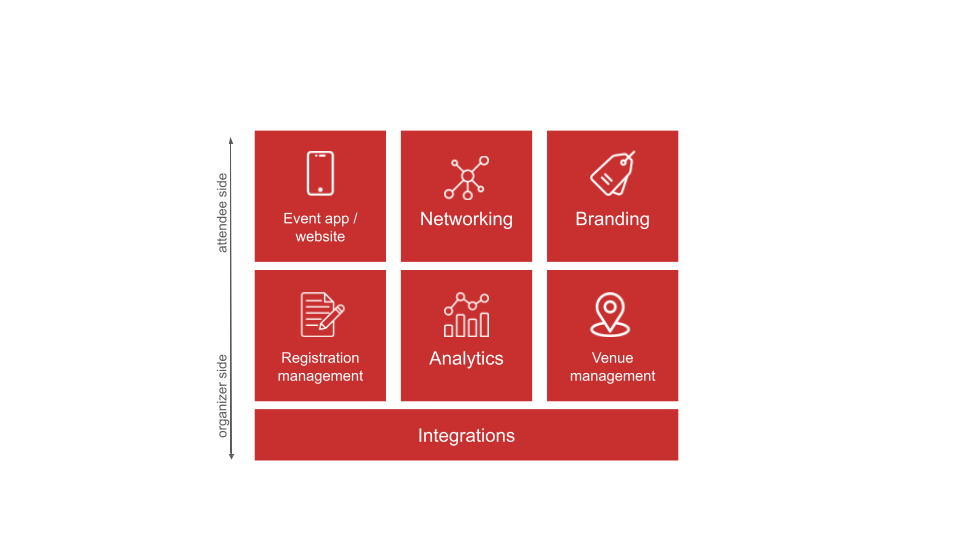Today’s events can vary dramatically, ranging from massive conferences to intimate webinars—each with its own unique flair. Think of these gatherings as the modern-day equivalents of everything from the grand Victorian balls to the small, cozy salons of the past. Whether you’re orchestrating large-scale corporate conferences or hosting smaller webinars, advanced technology has revolutionized how effortlessly we can bring them to life. From automated registration systems to real-time analytics, integrating cutting-edge software can transform the planning and enjoyment of any event.
But with so many digital options available, what features should you prioritize? Picture the meticulous organization behind iconic affairs like the Met Gala or the Oscars, where every detail counts. Here’s what our experts recommend, based on valuable feedback from our clients.
The event management business and software landscape
Event management software is a huge deal by now, and not even COVID-related restrictions of the early 2020s could do anything about it. According to a report by MarketsandMarkets, the event management software market size was expected to grow from USD 6.0 billion in 2019 to USD 12.4 billion by 2024, at a Compound Annual Growth Rate (CAGR) of 15.0% during the forecast period – and the crisis pretty much left that prediction intact.
If there’s one thing where it all mattered, it’s that modern events have become more complicated than ever before, calling for tech to solve organization issues. A survey by EventMB revealed that 87% of event professionals consider technology to be a critical factor in the success of their events. With events ranging from global conferences hosting thousands of attendees to localized trade shows requiring intricate logistics, the necessity for robust software solutions has never been more evident. Moreover, the proliferation of virtual and hybrid events has further accelerated this trend.
Data analytics, in particular, is revolutionizing business event management by enabling organizers to make data-driven decisions. Statistics show that events utilizing data analytics tools see a 20% increase in attendee satisfaction and a 15% improvement in return on investment (ROI). These tools help planners track registration trends, attendee engagement, and post-event feedback in real-time, allowing for continuous optimization and personalized attendee experiences. Furthermore, automation features—such as automated email marketing, real-time reporting, and secure financial transactions—significantly reduce administrative overheads, making event planning more efficient and effective.
Choosing event management software for small businesses vs. large corporations
When it comes to event management software, the needs of large and small businesses can differ significantly. Larger enterprises typically host grand conferences and extensive trade shows that demand robust, scalable software solutions. This software must handle complexities such as high-volume registrations, multiple breakout sessions, detailed analytics, and seamless integrations with other enterprise systems.
For large businesses, the ability to streamline operations and enhance attendee experiences is paramount. Event management platforms like Cvent and Eventbrite offer features such as automated check-ins, advanced networking capabilities, and AI-driven attendee engagement tools. These features are crucial for corporations aiming to create memorable, large-scale events that resonate with thousands of attendees and deliver quantifiable ROI.
In contrast, small businesses and startups often focus on more intimate events such as webinars, small workshops, or local meetups. Their requirements lean towards simplicity, affordability, and ease of use. According to the Event Manager Blog’s 2022 report, over 60% of smaller event organizers prioritize cost-effective solutions, with around 45% highlighting the need for user-friendly interfaces. Platforms like Zoom for webinars or Eventzilla for small events provide the essential functionality without the overwhelming complexity or high costs, offering features such as streamlined ticketing, basic attendee tracking, and easy-to-navigate dashboards.
Despite their differences, both large and small businesses share a common goal: to deliver successful, well-organized events that meet their specific objectives. Whether it is a large conference platform or small event management software, the key lies in selecting software that aligns with the scale and complexity of the event, ensuring that the chosen solution can grow and adapt alongside the business. By understanding and addressing these varying needs, organizations can better leverage technology to enhance their business event planning and execution processes.
The challenges of event software
Despite its benefits, selecting the right software can present several challenges. One major hurdle is integration issues. Ensuring that the new software integrates seamlessly with your current systems, such as Salesforce CRM, can be daunting. Ideally, your event management solution should sync effortlessly without necessitating extensive workarounds.
User adoption is another critical factor. Training team members to use new tools efficiently is crucial for successful implementation. A study by the Change Management Learning Center (surviving multiple debunking attempts) found that 70% of change initiatives fail, with inadequate training being a significant contributing factor. Ensuring proper training can mitigate these challenges and increase the chances of successful software adoption.
Cost is always a concern when it comes to adopting new technology. Balancing the features offered with budget constraints remains a constant challenge. According to EventMB, 45% of event planners cite budget restrictions as the most significant barrier to adopting new business event technology. Striking the right balance between functionality and affordability is essential for making a wise investment.
So should you stick to the available out-of-the-box software, or go for custom event app development services? The answer lies with the features that will actually make an impact, depending on the type of events you’re up to organizing. Let’s explore these (and their impact) in some more detail.
Top 7 features to look for in event management software
#1 Comprehensive Registration Management
Comprehensive registration management is crucial when handling attendee registrations, and there are several essential features to look for in a solution. Customizable registration forms allow organizers to tailor forms to collect specific attendee information, such as dietary preferences and session choices. This flexibility ensures that all necessary details are captured efficiently.
Automated confirmation and reminders can significantly reduce the need for manual follow-up. Research by HubSpot indicates that automated emails can improve open rates by 70.5%, making this feature incredibly valuable for maintaining attendee engagement and ensuring they receive important event information.
Secure payment processing is another vital aspect. Protecting attendee payment details is critical, especially considering the rising threat of cybercrime. According to Cybersecurity Ventures, cybercrime is expected to cost the world $6 trillion annually by 2021, underscoring the importance of secure transactions to safeguard sensitive financial information.
In summary, effective registration management hinges on customizable forms, automated confirmations and reminders, and secure payment processing, each playing a pivotal role in creating a seamless and secure registration experience for attendees.
#2 Event Website & Mobile App Creation
A professional event website can significantly boost engagement and provide essential information to attendees. One key feature is a drag-and-drop builder, which enables easy design and updates without requiring coding knowledge.
SEO optimization is another critical feature, as it helps improve the website’s visibility on search engines. BrightEdge reports that organic search contributes to 53.3% of all website traffic, emphasizing the importance of optimizing your event site for better reach.
Ensuring mobile responsiveness is crucial for providing a seamless experience across all devices. Statista highlights that as of 2023, 54.7% of global website traffic came from mobile devices, making it essential for event websites to be mobile-friendly.
Interactive maps are invaluable for helping attendees navigate the venue. Indoor positioning systems can enhance event navigation by 40%, according to IndoorAtlas. This feature ensures that attendees can easily find their way around the business event space.
Personal schedules are another useful feature, allowing attendees to manage their agendas effectively. Lastly, push notifications are a powerful tool for sending updates and reminders directly to attendees’ phones. Localytics found that push notifications can increase app engagement by up to 88%, making it easier for event organizers to keep attendees informed in real-time.

#3 Networking Opportunities
To facilitate connections between attendees, it is important to offer features designed to enhance networking opportunities. Matchmaking algorithms can suggest meetings based on interests and profiles, while in-app messaging provides a secure and convenient way for attendees to communicate.
Additionally, virtual meeting rooms are essential for hosting video calls and discussions. The surge in Zoom usage during the pandemic underscores the importance of having reliable video conferencing options available.
In summary, effective networking at events can be achieved through matchmaking algorithms, in-app messaging, and virtual meeting rooms, each contributing to a more connected and satisfying attendee experience.
#4 Real-Time Analytics
Understanding your event’s performance is critical. Key real-time analytics features to look for include live dashboards, which allow you to monitor registrations, attendance, and engagement in real time. Post-event reports are also essential for evaluating success and identifying areas for improvement. Additionally, data export options enable easy access to raw data for further analysis, addressing a common issue as Experian states that 95% of organizations see managing unstructured data as a problem.
#5 Customizable Branding
Your event should reflect your brand identity. Look for features such as brand colors and logos to align the software interface with your company branding. Forbes notes that a consistent brand presentation across all platforms can increase revenue by up to 23%. Ensure all communication, including emails, tickets, and badges, reflects your brand, as email marketing boasts an ROI of 4400%, highlighting the importance of brand consistency. Additionally, utilizing a custom URL enhances professionalism. According to DigitalDonut, vanity URLs can improve click-through rates by up to 39%.
#6 Organizing the Physical Venue
Effectively managing the physical venue is integral to the success of any event. Business event management software can greatly simplify the process of venue organization, ensuring a seamless experience for both attendees and organizers. Start with layout and seating arrangements; use software to design the event layout and specify seating arrangements tailored to different sessions, break areas, and team setups. For instance, Glastonbury Festival uses specialized software to map out tent locations, stage placements, and camping areas, ensuring an organized and enjoyable experience for festival-goers.
Resource allocation is another critical aspect. Ensure optimal distribution of resources, such as audiovisual equipment, presentation materials, and catering services. Coachella Valley Music and Arts Festival utilizes event management software to track and manage resources like sound systems, light setups, and artist accommodations, thereby maintaining a smooth operational flow. Lastly, signage and wayfinding are essential. Plan and manage signage placement and digital wayfinding solutions to guide attendees effortlessly throughout the venue. CES (Consumer Electronics Show) in Las Vegas integrates interactive maps with their event app, allowing attendees to navigate through expansive exhibition halls and find session locations with ease.
#7 Seamless Integrations
Your event management software should easily integrate with other tools you use to ensure seamless operations. Start with CRM integration to sync attendee data with your customer relationship management system. According to Nucleus Research, integrating CRM can increase sales productivity by 14.6%. Next, connect with your email marketing tools for seamless communication. Lastly, promote your event and engage with attendees on social platforms. Eventbrite indicates that social media integrations can increase event attendance by up to 25%.
Conclusions
Choosing the right business event management software can significantly enhance your event planning and execution process. By focusing on these seven essential features—comprehensive registration management, event website creation, integrated networking opportunities, real-time analytics, customizable branding, mobile event app, and seamless integrations—you can ensure a smoother, more successful event experience.
Lionwood’s experts (who have had a hand in writing this very article) have extensive expertise in creating and managing event organization software, ready to be offered within consultations for your own event management solutions. You can contact us at any time to discuss how Lionwood can help you bring your vision to reality and enhance it with the best industry practices.














